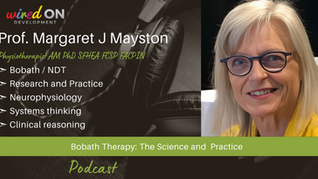The Real State-of-The-Evidence in Pediatric Rehabilitation with James Sulzer
- Aug 5, 2024
- 3 min read
Updated: Apr 26, 2025

James S. Sulzer PhD
Staff Scientist and Associate Professor
of Physical Medicine and Rehabilitation
James Sultzer is an academic neurorehabilitation engineer and a father to a child with a significant brain injury. This conversation is a raw look at the real state of the evidence in pediatric neurodisability. James takes us through his lived experience of having to make incredibly difficult decisions as he sought out the best care for his daughter. We cover the value of goal setting and home programs all the way to trying to pick out the fraud and the pseudoscience from the cutting-edge therapies that give us hope.
This is a profoundly important conversation that is a must-listen for everyone working with families who have children with disabilities.
I know you'll get a lot out of it.
Enjoy!
____________________________________________________________________________________________________________________
For handy links to things we've discussed in this interview, scroll down to the Resources Section at the bottom of the page.
Listen, enjoy, share...
Podcast Highlights
04:16 minutes- Exoskeleton Research and Spasticity
14:58 minutes- Goal Setting
47:13 minutes- The Importance of Realistic Goals
50:24 minutes- Goals and motivation
16:51 minutes- The brilliance of pediatric therapists
17:56 minutes- Therapy Intensity and Home Programs
18:56 minutes- Multi-Disciplinary Teams
20:41 minutes- The impact of School on therapy
21:10 minutes- Therapy in real life
23:01 minutes- Hyperbaric Oxygen Therapy
26:56 minutes- Challenges in Pediatric TBI Research
28:11 minutes- Making sense of research
41:51 minutes- The Role of Peer-Reviewed Research
31:16 minutes- Evaluating Therapy Effectiveness
35:52 minutes- High Tech vs. Low Tech in Rehab
38:37 minutes-Evaluating New Medical Devices and Therapies
39:35 minutes- Understanding Medical Fraud and Clinical Trials
40:44 minutes- Challenges in Making Medical Decisions
52:32 minutes- Engineers as part of the therapy team
57:54 minutes- Advice for Caregivers and Clinicians
Biography
Dr. James Sulzer is a Staff Scientist at MetroHealth Hospital and an Associate Professor in Physical Medicine and Rehabilitation at Case Western Reserve University in Cleveland, Ohio. His research primarily focuses on improving mobility for individuals who have experienced stroke, utilizing innovative technologies such as robotic exoskeletons, electrical stimulation, and wearable sensors.
Dr. Sulzer's educational background includes a BS in Mechanical Engineering from Ohio State University, and his MS and PhD, also in Mechanical Engineering, from Northwestern University and the Rehabilitation Institute of Chicago, now known as the Shirley Ryan AbilityLab. He completed his postdoctoral fellowship at the Swiss Federal Institute of Technology in Zurich. Before joining MetroHealth and Case Western, he was a faculty member in Mechanical Engineering at the University of Texas at Austin.
Additionally, Dr. Sulzer is a member of the United Cerebral Palsy National Research Council and a Board member of an adaptive toy organization in Northeast Ohio, RePlay for Kids.
Dr. Sulzer's publications cover a range of topics, including:
Robotics and Walking Exoskeletons: Dr. Sulzer has developed robotics for walking intended to help those with stroke improve mobility.
Neurophysiology: Dr. Sulzer has explored the neurophysiological properties of people with stroke during walking.
Wearable sensing: Dr. Sulzer uses wearable sensors to track the dosage of therapy in order to help determine what regimens are associated with better recovery.
Neurofeedback and Real-time fMRI: His work explores how neurofeedback can help individuals self-regulate brain activity. For example, his research on neurofeedback-mediated self-regulation of the dopaminergic midbrain shows potential applications in treating neurological and psychiatric conditions.
For more detailed information on his work and publications, visit his Google Scholar Profile or (Neurotree).
LINKS
Mentions:
HBOT-The Efficacy of Hyperbaric Oxygen Therapy in Traumatic Brain Injury Patients: Literature Review and Clinical Guidelines
F-words - Interview with Prof Rosenbaum
Neurofeedback-mediated self-regulation of the dopaminergic midbrain
CBG Café -Go baby go café: a case study on an immersive rehabilitation environment to improve functional outcomes and quality of life.
Here's a snapshot of the Early Therapy Home Program we disused in the interview:





















Discussions like this highlight how important evidence-based practice is in pediatric rehabilitation. Staying critical of research quality really matters for practitioners. It makes me think about how health and social care courses address this balance does Orvantaopencollege encourage learners to question evidence and apply it thoughtfully in real settings?